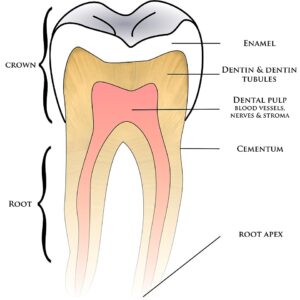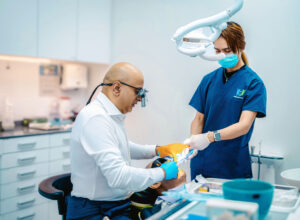
Chipped a tooth? Don’t panic, take a deep breath!
You haven’t broken the internet, just a tiny piece of enamel.
Also you’re not the first person to do it, and you definitely won’t be the last.
It happens more often than you’d imagine: one wrong bite on a popcorn kernel, a weekend football game gone rogue, or that midnight “one last bite” moment.
The best part is…
This is one of the most common dental issues, and it’s usually an easy fix. Whether it’s a small chip or a slightly bigger crack, your smile can often be restored in just one visit.
As a dentist in Singapore, Orchard Road, I’ve helped many patients fix various levels of chipped and cracked teeth. I do this with speed, ease, and comfort.
So, let’s break it down together: step by step.
LDR / Quick Takeaway: What You Should Know
- Act fast: Rinse your mouth, protect the tooth, and call your dentist.
- Don’t ignore it: Even small chips can worsen.
- Fix options include: bonding, veneers, crowns, or root canal treatment, depending on the severity of the issue.
- Key takeaway: Quick treatment = less pain, lower cost, happier teeth.
First Things First: Your Immediate 5-Step Action Plan
If you’ve chipped a tooth, don’t panic; quick, calm action can make all the difference.
Here’s what I usually tell my patients to do right away:
- Rinse with warm salt water to maintain cleanliness and soothe the area.
- Try to save the broken piece (if you can): Pop it in a clean container with milk or saline. In some cases, I can bond it back into place.
- Cover sharp edges: Use dental wax or sugar-free gum if you have it. This can protect your tongue from feeling as if it has hit a razor blade.
- Avoid chewing on that side: Go easy on your tooth. Stick to soft foods until your dentist can take a proper look.
- Call a dentist as soon as possible: The earlier I see it, the simpler (and more comfortable) the fix tends to be.
What Happens When You Chip a Tooth
In my 27+ years of practice, I’ve seen just about every kind of chipped tooth, from tiny enamel nicks to full-on “I bit into a crab shell and instantly regretted it” moments.
Here’s the thing: not every chip needs an emergency root canal, but knowing what kind of chip you have helps you understand how urgent the fix is and keeps panic levels in check.
| Type of Chip | What it Means | Severity |
| Tiny Enamel Chip | Cosmetic, usually painless | Mild |
| A broken cusp (chewing surface) | May cause sensitivity, but the tooth structure is intact | Moderate |
| Cracked tooth (partial) | May need a crown or bonding, can worsen | Moderate to Severe |
| Deep fracture (nerve exposed) | Needs urgent treatment, like a root canal | Severe |
Some chips are so small you can barely see them. Others make your tongue feel like it’s discovered a cliff edge.
The good news?
Every single one of these can be treated, and often faster than you’d think.

Professional Treatment Options to Repair a Chipped Tooth
When it comes to how to fix a chipped tooth, there’s no “one-size-fits-all” magic wand. The right treatment depends on how big the chip is, where it’s located, and whether the nerve is involved.
In my years of practice, I’ve seen tiny chips that just need a quick polish and dramatic fractures that require a crown and a calming cup of tea afterward.
The good news is – There’s a solution for every situation.
Here’s a simple breakdown of the most common chipped tooth repair options I use in my clinic:
| Treatment Type | Best for | Duration | Cost Range |
| Dental Bonding | Small chips, front teeth | 30-60 minutes | $450 |
| Porcelain Veneers | Visible front teeth, cosmetic fixes | 1-2 visits | $1250 |
| Dental Crown | Larger cracks or molar damage | 1-2 visits | $250 – $1600 |
| Root canal + crown | Deep fractures or nerve exposure | 1-2 visits | $700 – $1250 |
A quick example from my chair:
A patient once walked in clutching their cheek and said, “I chipped my molar on a popcorn kernel.” (Yes, popcorn is a repeat offender.)
It turned out to be a bigger crack, so I placed a custom dental crown.
A few days later, they were back to enjoying their movie snacks, minus the dental drama.
Whether it’s a small bonding job or a full crown, the aim is simple: restore your tooth’s function and keep your smile looking great.
Not sure which option is right for you?
Can You Fix a Chipped Tooth at Home?
(A Word of Caution)
I know, when you first chip a tooth, it’s tempting to turn to Google or grab a “miracle” DIY kit. But let me be real with you… Teeth are not a weekend craft project.
Temporary home care can protect the tooth, but it won’t repair it. And trying to fix it yourself can actually make things worse.
| DIY “Fix” | What can go wrong? |
| Filling or smoothing at home | You can accidentally deepen the crack or damage your enamel |
| Using glue or quick fixes | Most adhesives are toxic and unsafe for your mouth |
| Ignoring the chip altogether | Leads to pain, infection, and more expensive treatments later |
Myth: “I can fix a chipped tooth at home with a quick hack.”
Fact: A dentist is the only professional qualified to restore your tooth without risk. This is true for both small chips and deeper fractures.
If you have a chipped tooth, the best way to protect it is by taking some simple steps:
- Eat soft foods
- Cover sharp edges with wax
- Rinse with care
- Then, see a dentist as soon as you can
Think of home care as a band-aid, not a cure. The real fix happens in the dental chair.
Why You Shouldn’t Ignore a Chipped Tooth
A chipped tooth may seem harmless at first, like a tiny scratch on your car. Easy to ignore. But just like that scratch, if you leave it alone, it can snowball into something bigger (and costlier).
Here’s what can happen if you don’t fix it early:
- Tooth sensitivity or sudden sharp pain when eating or drinking.
- Deeper cracks that weaken your tooth over time.
- Bacteria can sneak in and trigger infections.
- A simple bonding fix can turn into an unplanned root canal.
Think of early treatment as damage control; quick, simple, and wallet-friendly.
Your future self and your smile will be grateful.
Where to Get a Chipped Tooth Repaired in Singapore
Choosing a dentist after chipping your tooth feels a lot like trying to pick a restaurant when you’re starving. Too many choices, not enough patience, and a tooth that refuses to let you forget it’s chipped.
That’s why I keep things simple at my clinic on Wheelock Place, Orchard Road. I’ve treated everything, from a tiny chip that needed a quick polish to someone who cracked a molar on a crab shell (yes, that happens more often than you’d think).

Here’s how it works:
- I examine the damage.
- I choose the best fix: bonding, veneer, or crown, depending on your tooth.
- You walk out ready to smile again.
A chipped tooth shouldn’t throw your week off track.
Frequently Asked Questions
1. How to tell if a tooth chip is serious?
A tooth chip is serious if it causes pain, sensitivity, or exposes the inner dentin.
2. How long will a chipped tooth repair last?
A chipped tooth repair can last several years, depending on the treatment. Dental bonding usually lasts 3 to 10 years. Veneers can last 10 to 15 years. Crowns often last over 15 years, especially with good oral care and regular check-ups.
3. Will a minor chipped tooth heal?
A minor chipped tooth will not heal naturally because enamel cannot regrow. But your dentist can smooth the rough edge or repair it with bonding.
4. What are the risks of not fixing a chip?
Not fixing a chipped tooth can lead to problems. You might have more tooth sensitivity. Cracks can spread, and decay may occur. There’s also a risk of infection. Ignoring small chips often leads to larger fractures and higher treatment costs later.
5. How much does it cost to repair a chipped tooth in Singapore?
The cost to repair a chipped tooth in Singapore depends on the severity and treatment type. Dental bonding costs around $450 per tooth, veneers range from $450 to $1,250, and crowns cost about $1600 to $1800 per tooth.
6. How can I prevent my teeth from chipping?
You can stop your teeth from chipping by:
- Avoiding hard foods
- Using scissors to open packages
- Wearing a mouthguard in sports
- Treating teeth grinding early
7. Will the repair for my chipped tooth be painful?
Repairing a chipped tooth is usually painless. Dentists use local anesthesia to numb the area, and most patients feel only mild pressure.
8. Do I need to see a dentist for a very minor chip?
You should see a dentist even for a minor tooth chip. Small chips can worsen over time, causing cracks or sensitivity. A quick check shows that the damage is minor. This helps stop bigger dental issues later.
9. Is it okay to leave a slightly chipped tooth?
Leaving a slightly chipped tooth untreated is not recommended. Even small chips weaken enamel and can cause cracks, decay, or infection. Visiting a dentist early strengthens the tooth and helps avoid costly repairs.

Dr. Prashanth Kanakamedala (BDS, MDS) is a Senior Dentist in Singapore with over 27 years of experience across the UK, Australia, and Singapore. Trusted by 8,500+ patients, he’s known for his gentle approach and dedication to helping every patient achieve a healthy, confident smile.


